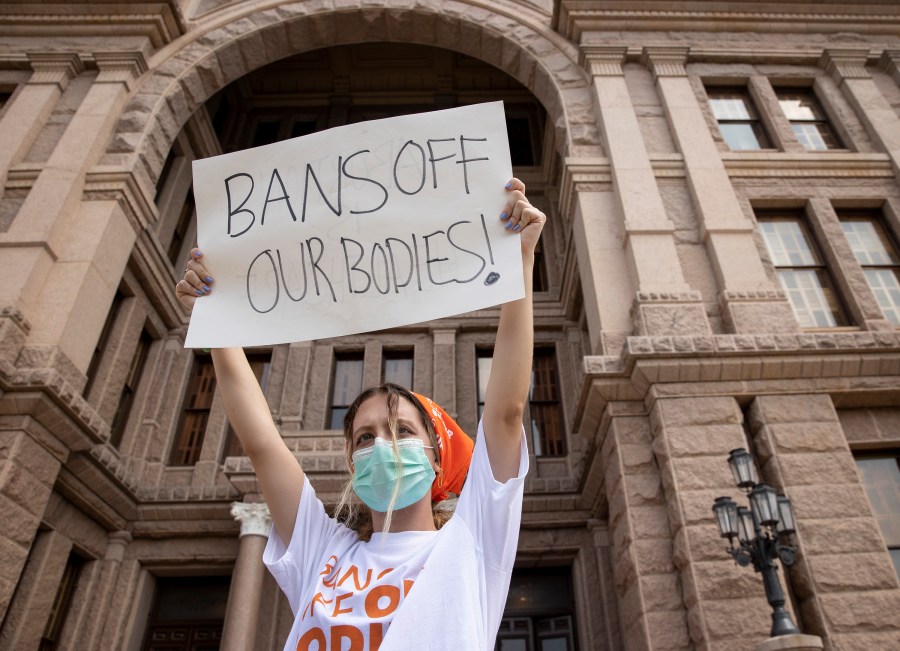AUSTIN, Texas (AP) — Most abortions in Texas are banned again after clinics that had raced to provide them during a two-day legal reprieve canceled appointments Saturday following a whiplash appeals court ruling.
The 5th U.S. Circuit Court of Appeals issued a one-page order Friday night, reinstating a Texas law that prohibits abortions once medical professionals can detect cardiac activity, usually around six weeks — and before some women know they’re pregnant.
Enforcement of the nation’s strictest abortion law is left up to private citizens who are deputized to file civil lawsuits against abortion providers, as well as others who help a woman obtain an abortion in Texas. Since taking effect in September, clinics in other states, including neighboring Louisiana and Oklahoma, have been inundated with patients from Texas.
Friday’s order from the New Orleans-based 5th Circuit is just the latest in the legal battle over the Texas law, known as Senate Bill 8. It came two days after a federal judge in Austin suspended the law, allowing providers to resume abortions.
Here are some questions and answers about the law and what’s next:
What has been the impact?
Abortion providers say the ramifications have been punishing and “exactly what we feared.” Some women are being forced to carry pregnancies to term, they say, or waiting in hopes that courts will strike down the law.
More than 100 pages of court filings in September offered the most comprehensive glimpse at how the near-total ban on abortion in Texas has played out. Physicians and executives at Texas’ nearly two dozen abortion clinics described turning away hundreds of patients, and some who showed up for appointments could not proceed because cardiac activity had been detected.
One Planned Parenthood location in Houston normally performed about two dozen abortions daily, but in the 10 days after the law took effect, the clinic had done a total of 52.
Clinics in nearby states, meanwhile, say care for their own residents is being delayed to accommodate women making long trips from Texas. Doctors say recent patients from Texas have included rape victims, as the law makes no exceptions in cases of rape or incest.
Whole Women’s Health has four clinics in Texas and was among providers that performed abortions in the state Thursday and Friday, after the lower court ruling allowed them. President and CEO Amy Hagstrom Miller said she didn’t have the number of abortions performed during the reprieve.
What was the landscape in Texas before?
More than 55,000 abortions were performed last year in Texas, which already had some of the nation’s strictest abortion laws, including a ban after 20 weeks of pregnancy.
Abortion providers in Texas have experience when it comes to abruptly ramping up operations again. In the early stages of the COVID-19 pandemic last year, abortions in Texas were all but banned for weeks under orders by Republican Gov. Greg Abbott that postponed surgeries “not immediately medically necessary.”
But providers were reporting staffing issues and worried some clinics would permanently shutter. A decade ago, Texas had more than 40 abortion clinics, but more than half of them closed for good during a protracted legal battle over a 2013 law that was ultimately overturned by the Supreme Court.
WHAT HAPPENS NEXT?
The Biden administration could bring the case back to the Supreme Court and ask the justices to quickly restore the federal judge’s order that blocked the law.
The law has already made one trip to the Supreme Court. The justices voted 5-4 not to intervene to prevent it from taking effect, but they said further challenges were possible. With the Biden administration’s challenge underway, the law could return to the justices quickly.
The federal judge who suspended the law — Robert Pitman, who was appointed by former President Barack Obama — wrote in a blistering 113-page opinion that the law was an “offensive deprivation” of the constitutional right to an abortion.
Whether the Biden administration’s lawsuit — which calls it “clearly unconstitutional” — was likely to succeed was a factor in Pitman putting the law on hold.
Texas Right to Life, the state’s largest anti-abortion group and a driver of the new law, has cheered the fact that it has stopped abortions every day that it has been in effect.
HOW ARE OTHER STATES RESPONDING?
After Texas’ law went into effect, Republican lawmakers in at least half a dozen states said they would consider introducing similar bills, with the goal of enacting the kind of abortion crackdown they have sought for years. Those states include Arkansas, Florida, Indiana, Mississippi, North Dakota and South Dakota.
Meanwhile, two dozen state attorneys general, all Democrats, submitted a brief in the Biden administration’s lawsuit saying a substantial reduction of abortion access in one state would result in health care systems being burdened elsewhere.
The City Council in Portland, Oregon, briefly considered a boycott of Texas businesses because of the new law but instead decided to set aside $200,000 to fund reproductive care.
The growing anti-abortion campaign is intended to reach the U.S. Supreme Court. Abortion opponents hope the conservative coalition assembled under President Donald Trump will end the constitutional right to abortion as established by the high court in the landmark 1973 Roe v. Wade ruling.
